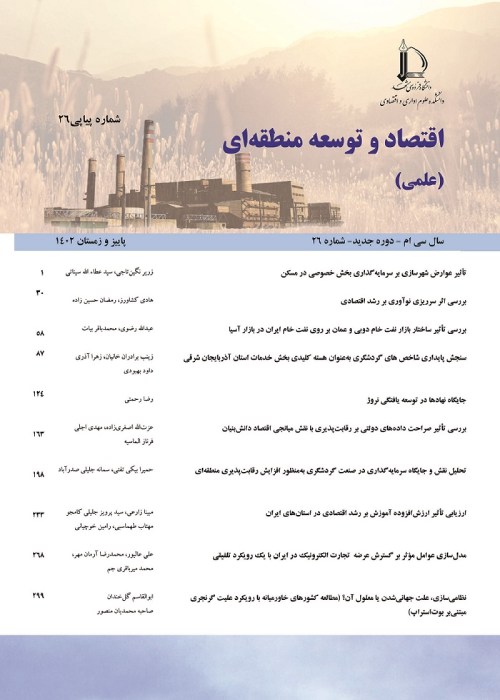The impact of urban development taxes on private sector investment in housing;A case study of Tehran city
Today, the issue of providing financial resources is important for municipalities all over the world, including Iran. These sources of income are influenced by macroeconomic conditions. This means that, in the economic recession, they decrease and city managers can not fulfill their duties. The financing methods required by municipalities in all parts of the world are direct sale of services, local taxes, use of government aid and issuance of bonds. But, the importance of these sources of revenue is different for big and even small cities in Iran. That is, the share of these resources from the total revenue of municipalities in a city like Tehran is low, and about 60-70% of the revenue sources of municipalities are related to housing.This dependence of the income of municipalities on their housing sector has become a serious challenge, because in times of recession in the housing sector, the income of municipalities decreases. Therefore, during the past decades, Tehran Municipality provides a discount for urban development fees during the recession. Now, the basic question of this study is that the urbaning permit fee have an effect on the private sector's investment in housing in Tehran.
THEORETICAL FRAMEWORK:
The theoretical analysis of investment in the housing sector is based on conventional investment theories in macroeconomics. Two important investment theories are discussed: the theory of the principle of acceleration (which itself is divided into two models of fixed acceleration and flexible acceleration model) related to the classics and the final efficiency theory of investment related to John Maynard Keynes. Acceleration pattern theory is based on the concept that changes in sales or income cause an increase in total investment. But Keynes believed that the amount of investment depends on the final efficiency of capital and interest rate. The relationship between investment and capital efficiency and interest rate is inverse. Both theories are used in this study.
In this study, an attempt is made to investigate the impact of urban development complications (permit issuance complications) on private sector investment in Tehran city housing. To do this, the Auto Regressive Distributed Lag (ARDL) was used, and the data obtained from the Central Bank of the Islamic Republic of Iran and the statistics of the Tehran municipality for the years 2010-2018. In this model, the dependent variable is influenced by the lag of the dependent variable itself and other independent variables. It should be noted that in order to investigate the long-term and short-term relationships between the dependent variable and other explanatory variables, collective methods such as the Engel-Granger method and ECM error correction models have been used.
The long-term model estimation results show that the coefficients of two macro-economic variables, i.e. GDP and liquidity, are positive and significant. The interest rate of bank deposits has a negative effect (according to common theories), but it is insignificant. The price of coins, as a competitor for housing, has a negative and significant effect, which is consistent with the initial expectation as well as previous studies. The total index of Tehran Stock Exchange has a positive and significant relationship with investment in the housing sector. Finally, the building permit fee do not have a significant impact on private sector investment. This shows that the reduction of building permit fee does not affect the motivation of private sector investors in Tehran housing in the long term.
CONCLUSIONS & SUGGESTIONS:
The long-term pattern shows that building permit fees do not have a significant effect on private sector investment in Tehran housing. This means that the discount in building permit fees may create sources of revenue for Tehran Municipality in the short term, but it has no effect in the long term. Other results of this model have shown that Tehran, macroeconomic variables such as GDP, liquidity and stock market index have a positive and significant effect on private sector investment in Tehran city housing. This means that the growth of national production will cause the growth of all economic sectors, including housing, and this will provide the necessary ground for the development of investment for the private sector. In addition, the increase in liquidity allows more resources to be transferred to the housing sector. Also, considering the large number of large construction companies in the stock market and providing financial resources from this market, the growth of the market has a positive and significant effect on investment in the housing sector of Tehran. The interest rate of bank deposits also has a negative but insignificant effect on investment in the housing sector, which can be caused by the high inflation in Iran's economy. Finally, coin price has a negative relationship with housing investment.Therefore, according to our results, it is suggested that Tehran Municipality stop applying discounts on urbaning permit fees and seek to identify sources of revenue and new methods of financing or use the items such as renovation fees, waste, business and trade, advertising boards and instruments available in the financial markets.
- حق عضویت دریافتی صرف حمایت از نشریات عضو و نگهداری، تکمیل و توسعه مگیران میشود.
- پرداخت حق اشتراک و دانلود مقالات اجازه بازنشر آن در سایر رسانههای چاپی و دیجیتال را به کاربر نمیدهد.



